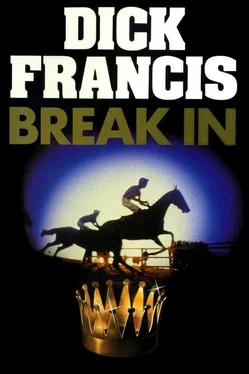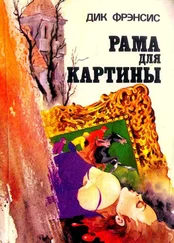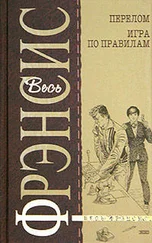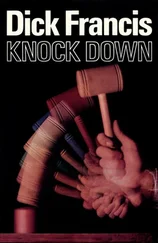There was no fruit cake left in the changing room.
‘Rotten buggers,’ I said.
‘But you never eat cake,’ my valet said, heaving off my sodden boots.
‘Every so often,’ I said, ‘like on freezing wet Fridays after a fall in the last race.’
‘There’s some tea still. It’s hot.’
I drank the tea, feeling the warmth slide down, heating from inside. There was always tea and fruit cake in the changing rooms; instant energy, instant comfort. Everyone ate cake now and then.
An official put his head through the door: someone to see you, he said.
I pulled on a shirt and shoes and went out to the door from the weighing room to the outside world. No one all day had appeared with a banker’s draft from Pollgate, and I suppose I went out with an incredulous flicker of hope. Hope soon extinguished. It was only Dusty, huddled in the weighing room doorway, blue of face, eyes watering with cold.
‘Is the horse all right?’ I asked. ‘I heard you caught him.’
‘Yes. Useless bugger. What about you?’
‘No damage. I got passed by the doctor. I’ll be riding tomorrow.’
‘Right, I’ll tell the guv’nor. We’ll be off, then. So long.’
‘So long.’
He scurried away into the leaden early dusk, a small dedicated man who liked to check for himself after I’d fallen that I was in good enough shape to do his charges justice next time out. He had been known to advise Wykeham to stand me down. Wykeham had been known to take the advice. Passing Dusty was sometimes harder than passing the medics.
I showered and dressed and left the racecourse via the cheaper enclosures, walking from there into the darkening town, where I’d left the rented Mercedes in a public parking place in the morning. Maybe it was unlikely that a repeat ambush would be set in the nearly deserted jockeys’ car park long after the last race, but I was taking no chances. I climbed unmolested into the Mercedes and drove in safety to London.
There in my comfortable bolthole I again made additions to my astronomical phone bill, arranging first for my obliging neighbour to go into my cottage in the morning and pack one of my suits and some shirts and other things into a suitcase.
‘Of course I will, Kit dear, but I thought you’d be back here for sure tonight, after riding at Ascot.’
‘Staying with friends,’ I said. ‘I’ll get someone to pick up the suitcase from your place tomorrow morning to take it to Ascot. Would that be all right?’
‘Of course, dear.’
I persuaded another jockey who lived in Lambourn to collect the case and bring it with him, and he said sure he would, if he remembered.
I telephoned Wykeham when I judged he’d be indoors after his evening tour of the horses and told him his winner had been steadfast, the princess’s two as good as could be hoped for, and one of the also-rans disappointing.
And Dusty says you made a clear balls-up of the hurdle down by Swinley Bottom in the last.’
Yeah,’ I said. ‘If Dusty can see clearly half a mile through driving sleet in poor light he’s got better eyesight than I thought.’
‘Er...’ Wykeham said. ‘What happened?’
‘The one in front fell. Mine went down over him. He wouldn’t have won, if that’s any consolation. He was beginning to tire already, and he was hating the weather.’
Wykeham grunted assent. ‘He’s a sun-lover, true-bred. Kit, tomorrow there’s Inchcape for the princess in the big race and he’s in grand form, jumping out of his skin, improved a mile since you saw him last week.’
‘Inchcape,’ I said resignedly, ‘is dead.’
‘What? Did I say Inchcape? No, not Inchcape. What’s the princess’s horse?’
‘Icefall.’
‘Icicle’s full brother,’ he said, not quite making it a question.
‘Yes.’
‘Of course.’ He cleared his throat. ‘Icefall. Naturally. He should win, Kit, seriously.’
‘Will you be there?’ I asked. ‘I half expected you today.’
In that weather?’ He sounded surprised. ‘No, no, Dusty and you and the princess, you’ll do fine.’
‘But you’ve had a whole bunch of winners this week and you haven’t seen one of them.’
I see them here in the yard. I see them on video tapes. You tell Inchcape he’s the greatest, and he’ll jump Ben Nevis.’
‘All right,’ I said. Icefall, Inchcape, what did it matter?
‘Good. Great. Goodnight, Kit.’
‘Goodnight, Wykeham,’ I said.
I got through to my answering machine and collected the messages, one of which was from Eric Olderjohn, the civil servant owner of the horse I’d won on for the Lambourn trainer at Towcester.
I called him back without delay at the London number he’d given, and caught him, it seemed, on the point of going out.
‘Oh, Kit, yes. Look, I suppose you’re in Lambourn?’
‘No, actually. In London.’
‘Really? That’s fine. I’ve something you might be interested to see, but I can’t let it out of my hands.’ He paused for thought. ‘Would you be free this evening after nine?’
‘Yes,’ I said.
‘Right. Come round to my house, I’ll be back by then.’ He gave me directions to a street south of Sloane Square, not more than a mile from where I was staying. ‘Coffee and brandy, right? Got to run. Bye.’
He disconnected abruptly and I put down my own receiver more slowly saying ‘Wow’ to myself silently. I hadn’t expected much action from Eric Olderjohn, civil servant, and certainly none with such speed.
I sat for a while thinking of the tape of Maynard, and of the list of companies at the end, of those who had suffered from Maynard’s philanthropy. Short of finding somewhere to replay the tape, I would have to rely on memory, and the only name I could remember for certain was Purfleet Electronics; chiefly because I’d spent a summer sailing holiday with a schoolfriend there long ago.
Purfleet Electronics, directory enquiries told me, was not listed.
I sucked my teeth a bit and reflected that the only way to find things was to look in the right place. I would go to Purfleet, as to Hitchin, in the morning.
I filled in the evening with eating and more phone calls, and by nine had walked down Sloane Street and found Eric Olderjohn’s house. It was narrow, two storeys, one of a long terrace built for low-income early Victorians, now inhabited by the affluent as pieds-à-terre: or so Eric Olderjohn affably told me, opening his dark green front door and waving me in.
From the street one stepped straight into the sitting room, which stretched from side to side of the house; all of four metres. The remarkably small space glowed with pinks and light greens, textured trellised wallpaper, swagged satin curtains, round tables with skirts, china birds, silver photograph frames, fat buttoned armchairs, chinese creamy rugs on the floor. There were softly glowing lamps, and the trellised wallpaper covered the ceiling also, enclosing the crowded contents in an impression of a summer grotto.
My host watched my smile of appreciation as if the reaction were only what he would have expected.
‘It’s great,’ I said.
‘My daughter did it.’
‘The one you would defend from the Flag ?’
‘My only daughter. Yes. Sit down. Has it stopped raining? You’d like a brandy, I dare say?’ He moved the one necessary step to a silver tray of bottles on one of the round tables and poured cognac into two modest balloon glasses. ‘I’ve set some coffee ready. I’ll just fetch it. Sit down, do.’ He vanished through a rear door camouflaged by trellis and I looked at the photographs in the frames, seeing a well-groomed young woman who might be his daughter, seeing the horse that he owned, with myself on its back.
He returned with another small tray, setting it alongside the first.
Читать дальше




